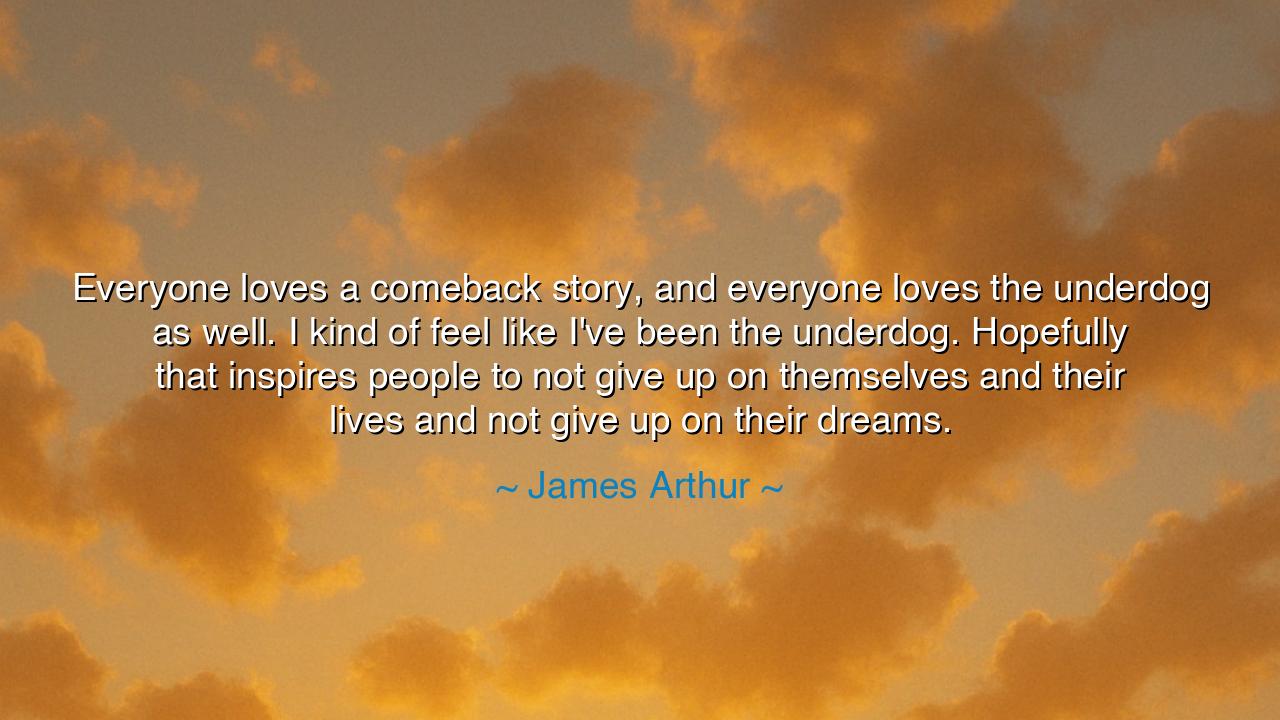
Everyone loves a comeback story, and everyone loves the underdog
Everyone loves a comeback story, and everyone loves the underdog as well. I kind of feel like I've been the underdog. Hopefully that inspires people to not give up on themselves and their lives and not give up on their dreams.






In the heartfelt and triumphant words of James Arthur, the singer whose voice carries both pain and resurrection, we find this timeless reflection: “Everyone loves a comeback story, and everyone loves the underdog as well. I kind of feel like I’ve been the underdog. Hopefully that inspires people to not give up on themselves and their lives and not give up on their dreams.” These words are not mere sentiment — they are the confession of a soul that has walked through ruin and found renewal. They echo the ancient truth that the human spirit is never so beautiful as when it rises again after defeat.
The origin of this quote lies in Arthur’s own journey — from the obscurity of hardship to the light of acclaim, from public collapse to redemption. After his early triumph on The X Factor, he faced rejection, controversy, and self-doubt. But through perseverance and faith in his art, he found his way back, not only to success, but to peace. When he speaks of being the underdog, he speaks not as a symbol of victory, but as one who has known the taste of despair — and chosen, again and again, to rise. His words remind us that the most inspiring stories are not those of unbroken triumph, but of brokenness made whole.
The idea that “everyone loves a comeback story” is woven deep into the fabric of human history. From the ancient epics to modern tales, we revere those who fall and yet return stronger. Consider the story of Nelson Mandela, who spent twenty-seven years in prison, cut off from the world, only to emerge with forgiveness and strength, leading his nation toward unity. Or the tale of Job from the Scriptures, who lost everything — health, wealth, and hope — yet through unwavering faith found restoration. These are not mere stories of luck or chance, but of will. They show us that defeat is not the opposite of victory; it is its foundation.
When Arthur says, “It has to do with not giving up on your dreams,” he touches upon the most sacred of human powers — perseverance. To dream is easy; to continue dreaming after the world has told you to stop is divine. The underdog, by his nature, is the one who fights against odds, who persists when the path is dark and the applause has faded. And it is precisely this struggle that makes his eventual triumph so powerful. For in the end, victory is sweetest not for those who have never fallen, but for those who have stood up after every fall.
There is also humility in Arthur’s words. He does not speak of glory for its own sake, but of inspiration — of using his story to ignite others. He wishes his journey to be a mirror in which others see their own strength reflected. This, too, is an ancient truth: that our struggles are not only for ourselves, but for those who watch and follow. The warrior who stands after defeat teaches the next generation that hope is never in vain. Thus, his victory becomes not his alone, but a light that guides the weary hearts of others.
His quote also carries a quiet challenge. It asks us: How do we face our own failures? Do we hide from them, or do we, like the underdog, use them as the fire that tempers the soul? The ancients would say that the gods favor the brave — not the flawless, but the unyielding. Each setback, each disappointment, can either harden the heart or refine it. The choice, as Arthur’s life shows, belongs to us. To give up is to die before death; to rise again is to live twice — once in the body, and once in the spirit.
Therefore, O seeker of hope, take this lesson to heart: never surrender your dream to the darkness of failure. Let your defeats become your teachers, not your chains. Stand again, and again, and again — until your persistence itself becomes your victory. Whether your dream is music or love or simply peace, hold fast to it, for the world belongs not to those who never stumble, but to those who refuse to stay fallen. And if ever you feel small, remember the words of James Arthur — that the world loves the underdog, because in him, every heart recognizes its own struggle to rise.






AAdministratorAdministrator
Welcome, honored guests. Please leave a comment, we will respond soon